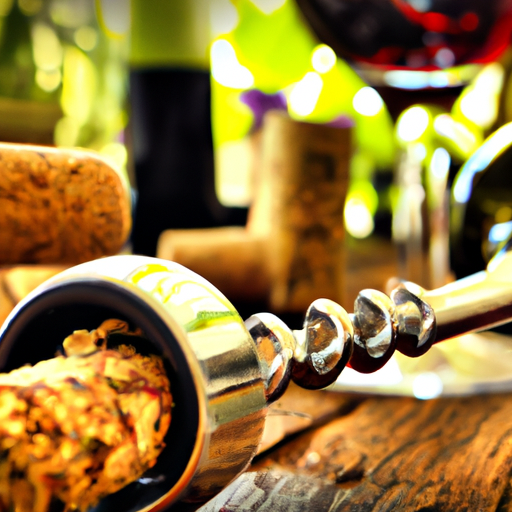
The Importance of Preserving Traditional Wine-Making Techniques
The world of wine is vast and diverse, with countless varieties and styles to choose from. In recent years, however, there has been a growing trend towards modern wine-making techniques that prioritize efficiency and consistency over tradition. While these methods may have their merits, it is important not to overlook the value of preserving traditional wine-making techniques.
Traditional wine-making techniques have been passed down through generations, often rooted in centuries-old traditions and practices. These methods have stood the test of time and have been refined over the years to produce wines of exceptional quality and character. By advocating for the preservation of these techniques, we ensure that the rich history and cultural heritage of wine-making are not lost.
One of the key reasons for preserving traditional wine-making techniques is the unique flavors and aromas they impart to the wine. Traditional methods often involve natural fermentation, where wild yeasts present in the vineyard and winery environment are allowed to ferment the grape juice. This natural fermentation process can result in complex and nuanced flavors that are not easily replicated by modern techniques.
Furthermore, traditional wine-making techniques often involve minimal intervention in the winemaking process. This means that the wine is allowed to develop naturally, without the use of additives or excessive manipulation. This hands-off approach allows the wine to express its true character and terroir, reflecting the unique qualities of the vineyard and the grapes themselves.
Preserving traditional wine-making techniques also helps to support small, family-owned wineries and vineyards. These producers often rely on traditional methods to create their wines, as they lack the resources and infrastructure to adopt modern techniques. By advocating for traditional wine-making, we ensure that these small producers can continue to thrive and contribute to the diversity of the wine industry.
In addition to the unique flavors and support for small producers, traditional wine-making techniques also have environmental benefits. Many modern techniques rely on the use of chemicals and additives to control fermentation and stabilize the wine. These practices can have negative impacts on the environment, as well as on the health of the consumer. By promoting traditional methods, we encourage a more sustainable and natural approach to wine-making.
It is important to note that advocating for traditional wine-making techniques does not mean dismissing or disregarding modern techniques altogether. There is room for both in the wine industry, and each has its own merits. However, it is crucial to recognize the value of preserving traditional methods and the unique qualities they bring to the wines.
In conclusion, the preservation of traditional wine-making techniques is of utmost importance. These methods have stood the test of time and have been refined over generations to produce wines of exceptional quality and character. By advocating for traditional wine-making, we ensure that the rich history and cultural heritage of wine-making are not lost. Furthermore, traditional techniques offer unique flavors, support small producers, and have environmental benefits. It is essential to strike a balance between traditional and modern techniques in order to maintain the diversity and integrity of the wine industry.
Exploring the Rich History and Cultural Significance of Traditional Wine

Advocating for Traditional Wine
Wine has been a beloved beverage for centuries, with a rich history and cultural significance that cannot be ignored. Traditional wine, in particular, holds a special place in the hearts of wine enthusiasts around the world. Its production methods, flavors, and connection to the land make it a unique and cherished drink.
One of the main reasons why traditional wine is so highly regarded is its connection to history. Traditional winemaking techniques have been passed down through generations, preserving the authenticity and integrity of the beverage. These methods often involve hand-harvesting the grapes, fermenting them in oak barrels, and allowing the wine to age naturally. This attention to detail and respect for tradition results in a wine that is deeply rooted in its cultural heritage.
Furthermore, traditional wine offers a wide range of flavors that cannot be replicated by modern winemaking techniques. The use of oak barrels, for example, imparts a distinct taste and aroma to the wine. This aging process allows the wine to develop complex flavors and a smooth texture that is highly sought after by connoisseurs. Additionally, traditional winemakers often prioritize the use of indigenous grape varieties, which further contributes to the unique flavor profiles of their wines.
Beyond its taste, traditional wine also has a deep connection to the land from which it originates. Many traditional winemakers practice sustainable farming methods, ensuring that their vineyards remain healthy and productive for generations to come. This commitment to the environment not only benefits the land but also enhances the quality of the wine. By working in harmony with nature, traditional winemakers are able to produce grapes that are full of character and express the terroir of the region.
In addition to its historical and environmental significance, traditional wine also plays a vital role in cultural celebrations and rituals. In many countries, wine is an integral part of religious ceremonies, weddings, and other important events. The act of sharing a bottle of traditional wine with loved ones is a symbol of unity and celebration. It brings people together, fostering a sense of community and connection.
Despite the many merits of traditional wine, it is facing challenges in today’s modern world. The rise of mass-produced, commercial wines has led to a decline in the appreciation for traditional winemaking methods. Many consumers are drawn to the convenience and affordability of these wines, often overlooking the craftsmanship and artistry that goes into producing traditional wine.
To advocate for traditional wine, it is important to educate consumers about its history, flavors, and cultural significance. Wine tastings, vineyard tours, and educational events can help people develop a deeper appreciation for traditional wine and understand the value it brings to the table. Additionally, supporting small, family-owned wineries that prioritize traditional winemaking methods can help ensure the preservation of this important cultural heritage.
In conclusion, traditional wine holds a special place in the world of wine. Its rich history, unique flavors, and connection to the land make it a beverage worth advocating for. By understanding and appreciating the craftsmanship and cultural significance of traditional wine, we can ensure that this beloved drink continues to be celebrated for generations to come.
Promoting Sustainability and Environmental Responsibility in Traditional Wine Production
Promoting Sustainability and Environmental Responsibility in Traditional Wine Production
In recent years, there has been a growing interest in sustainable and environmentally responsible practices in various industries. The wine industry is no exception, with many vineyards and wineries adopting sustainable practices to minimize their impact on the environment. However, amidst this trend, it is important not to overlook the value and significance of traditional wine production methods.
Traditional wine production methods have been passed down through generations, preserving the authenticity and cultural heritage of winemaking. These methods often involve a deep understanding of the land, climate, and grape varieties, resulting in wines that reflect the unique terroir of a particular region. By advocating for traditional wine, we can ensure the preservation of these time-honored techniques and the distinctiveness of wines produced using them.
One of the key aspects of traditional wine production is the emphasis on organic and biodynamic farming practices. Organic farming avoids the use of synthetic pesticides and fertilizers, relying instead on natural methods to maintain soil health and control pests. Biodynamic farming takes this a step further by incorporating holistic principles, such as lunar cycles and the use of herbal preparations, to enhance the vitality of the vineyard ecosystem. These practices not only promote the health of the vines but also contribute to the overall sustainability of the environment.
Another important aspect of traditional wine production is the use of native yeast for fermentation. Native yeast refers to the naturally occurring yeast present on grape skins and in the vineyard environment. This yeast plays a crucial role in the fermentation process, imparting unique flavors and aromas to the wine. By relying on native yeast, winemakers can create wines that truly express the character of the grapes and the terroir, resulting in a more authentic and nuanced drinking experience.
Furthermore, traditional wine production often involves minimal intervention in the winemaking process. This means avoiding excessive filtration, fining, and the use of additives. By allowing the wine to develop naturally, winemakers can preserve the integrity of the grapes and the unique flavors they possess. This approach not only results in wines with greater complexity and depth but also reduces the need for chemical interventions, making it more environmentally friendly.
Advocating for traditional wine also means supporting small, family-owned wineries that have been producing wine for generations. These wineries often have a deep connection to the land and a strong commitment to preserving their heritage. By choosing wines from these producers, consumers can contribute to the sustainability of traditional winemaking practices and help ensure the survival of these small-scale operations.
In conclusion, promoting sustainability and environmental responsibility in traditional wine production is crucial for preserving the authenticity and cultural heritage of winemaking. By advocating for organic and biodynamic farming practices, the use of native yeast, and minimal intervention in the winemaking process, we can support the production of wines that truly reflect the terroir and showcase the unique flavors of the grapes. Additionally, by supporting small, family-owned wineries, we can contribute to the sustainability of traditional winemaking practices and help preserve this rich cultural tradition for future generations to enjoy.






